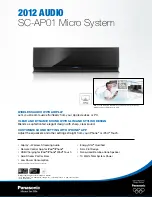
1. Power: Press for 2 seconds to power the receiver on or off.
2. Channel Display: LED channel displays the channel number.
3. Button : When the LED display starts flashing, press this button to change the channel forward.
△
4. Button : When the LED display starts flashing, press this button to change the channel backward.
▽
5. Set / Scan Button:
●
Auto Scan: Press 3 seconds to search to the next clear channel automatically.
OR
●
Manual Channel Set: Press 1 second, LED display will flash. Press the channel button or
△
to change the channel. Wait for the LED channel display to flash five times to lock the
▽
channel or press SET button for 1 second to lock the channel.
6. RF Indicator: LED will light red when wireless signal is received.
7. AF Indicator: LED will light green when audio signal is received.
8. Volume Control: Use this rotary control to adjust the receiver output level to match the input
sensitivity of an audio mixer or an amplifier.
9. Antenna: Fixed-length UHF antenna, removable. Remote mounting kit available.
10. Antenna Position Adjust: For best results, position antennas pointing upward and away from
each other, approximately 45 degrees from horizontal.
11. Balanced Output: 3-pin XLR connector provides balanced low-impedance output.
12. Unbalanced Output: Unbalanced ¼ inch mono jack audio output for connecting to unbalanced
mixer input.
13. Mic/Line Switch: Select output of XLR balanced connector or ¼ in. unbalanced phone jack. It
can be set for microphone (-20dB) or line-level (0dB).
14. Squelch Adj. : The squelch adjusts the receiver’s sensitivity to help prevent external
interference. Setting the squelch too high will reduce the range of the system. Think of it as
adjusting the size of the operating area, but remember that as 'operating area' grows, so does
possible interference. For most users, the factory setting is good.
15. DC IN: DC input connector for the supplied 12VDC Power Supply.
5
Summary of Contents for Special Projects EVO Scan16
Page 1: ......


































